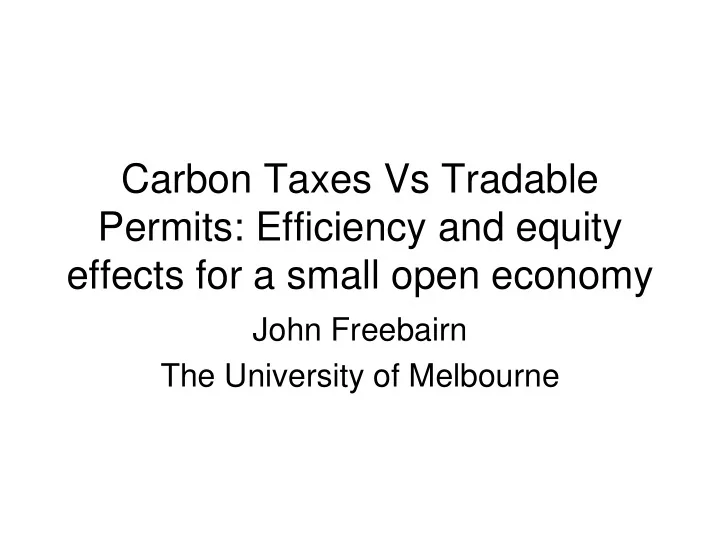

Carbon Taxes Vs Tradable Permits: Efficiency and equity effects for a small open economy John Freebairn The University of Melbourne
Reduce Greenhouse Gas Emissions • A global externality market failure • Policy intervention options – Carbon tax – Tradable permit • Auction permits • Gift permits – Other • Economic analysis and comparison – Effects on market outcomes – Efficiency – Distribution and equity • Focus on small open economy as an early mover
Policy Context and Challenges • Global pollution • Long time lags • Uncertainty and change • Absence of a global government
Single Product, eg electricity, meat • Market solution Product price S = MPC Pbau D = MPB (=MSB) Qbau Quantity of electricity, transport, meat, etc
Single Product, eg electricity, meat • Society solution with pollution cost MSC = MPC + MEC Product price S = MPC P* d Pbau D = MPB (=MSB) Q* Qbau Quantity of electricity, transport, meat, etc
Pollution Product, and Aggregate Consumer Products Price or MAC cost per unit MEC emission T* h k i j Q* Qbau Quantity of emissions
Tax Vs Tradable Permit: Perfect Knowledge • Tax at T* – Extra production cost – Pollution falls to Q* • Tradable permit for pollution quota at Q* – Extra production cost – Market price T* • (Absolute and relative) Consumer prices and production costs rise for the pollution intensive • Efficiency gain of area ‘k’
Tax Vs Tradable Permit: Perfect Knowledge • Distributional effects (of effectively an additional and new indirect tax) – Government gains area ‘h + i’ – Distribution between producers and consumers depends on relative demand and supply elasticities • Supply perfectly elastic: all passed on to consumer • Producer price taker: all passed back to fixed resource owners – Inter-country distribution favours free riding
Tax Vs Tradable Permit: Imperfect Knowledge and Shifts of MAC and MEC Functions • Imperfect knowledge of MAC and MEC – Decision errors – Favour price if MAC less elastic than MEC – Unclear story in long run for greenhouse case • (Short term and cyclical) Shifts over time of MAC – Tax: stable price, variable quantity – Tradable permit: stable quantity, variable price – Decision advantages for stable price
New Zealand Example: Base and Economic Incidence • Petroleum products – Destination base – 100% pass through to buyers • Electricity – Non-traded product – < 100% pass through • Agriculture – Production base – Negligible pass forward if early mover • Users of petroleum and electricity inputs – Production base – Close to 100% pass forward for non-traded – Close to 0% pass forward for non-traded if early mover
Global Policy Challenge • Need a cooperative global agreement • Tax Vs Tradable Permit – In principle, harmonised tax and open trade in permits would have similar desired effects – In reaching a political agreement, tax option • Recycles most revenue within each country and minimises inter-country redistribution • Better isolates administrative failures to individual country – Current policy impetus on permits
Country C Country E Price Price or MAC1 or tax tax MAC1 MAC2 MAC2 T* T* a b c d e f g h Quantity of emissions Quantity of emissions
Assisting the Trade Exposed Energy Intensive Industries • Early mover with production base – Increase imports, lose exports, currency depreciation, but • Change country comparative advantage • Carbon leakage • Unnecessary industry restructuring and reversal • Destination base corrects these problems. Tax seems more amenable • All countries sign global agreement – Back to non-traded model, with no case for assistance
Assisting the Trade Exposed Energy Intensive Industries • Australian and New Zealand proposals – Exempt imports, import substitutes and exports – With undesired effects of: • Narrows effective base for reduction of emissions • Distorts decisions between the traded and non- traded sectors for no market failure reason
Conclusions: Tax Vs Tradable Permits to Reduce Greenhouse • Similar effects: – Raise costs to tap broad set of options to change consumption, production and R&D to reduce pollution – Base points of application, and administrative challenges • Some advantages for tax option: – Price stability, at cost of quantity volatility, favours decision making – More natural consumption base for assisting TEEI when early mover – May help global agreement making • Some advantages for tradable permit option: – Has the political initiative
Recommend
More recommend